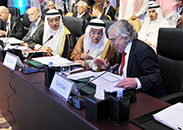The Ministerial Conference of the sixth Carbon Sequestration Leadership Forum (CSLF) issued a Communiqué that calls for accelerating carbon capture and storage (CCS) deployment through strong global commitments and supportive government policies.
The Ministerial Communiqué also stresses that "more needs to be done to bring CCS to the marketplace."
 7 November 2015: The Ministerial Conference of the sixth Carbon Sequestration Leadership Forum (CSLF) issued a Communiqué that calls for accelerating carbon capture and storage (CCS) deployment through strong global commitments and supportive government policies. The Ministerial Communiqué also stresses that “more needs to be done to bring CCS to the marketplace.”
7 November 2015: The Ministerial Conference of the sixth Carbon Sequestration Leadership Forum (CSLF) issued a Communiqué that calls for accelerating carbon capture and storage (CCS) deployment through strong global commitments and supportive government policies. The Ministerial Communiqué also stresses that “more needs to be done to bring CCS to the marketplace.”
The Ministerial Conference, which took place on 4 November 2015, in Riyadh, Saudi Arabia, was attended by more than 100 participants, including 26 Ministers and other high-level officials. The Conference was opened by CSLF Ministerial Co-Chairs Ernest Moniz, US Secretary of Energy, and Ali bin Ibrahim Al-Naimi, Saudi Arabia’s Minister of Petroleum and Mineral Resources.
Calling on governments globally to continue committing “manpower, brainpower, investment and research” to CCS-related efforts, Al-Naimi noted that there is “agreement that reducing emissions and combating climate change are global priorities,” and stressed CCS as a critical part of “the global quest to reduce emissions.”
During the day, Conference participants heard presentations on the role of CCS in the Middle East and globally, and opportunities presented by the upcoming UN Paris Climate Change Conference. In addition, the CSLF Technical and Policy Groups and Stakeholders gave presentations on the topic of ‘Key Actions Needed for CCS at the 2015 UN Climate Change Conference (COP 21) to Ensure a Clean Energy Future.’
The day also included two roundtable discussions namely on moving beyond CCS demonstration projects, and national and international policies to accelerate deployment of CCS. Participants also discussed country experiences, opportunities, policies and actions needed for CCS deployment.
The signatories of the Ministerial Communiqué, inter alia: express encouragement by the progress made in CCS research, development, demonstration and global deployment since 2013; stress that more needs to be done to bring CCS to the marketplace where it can help combat climate change; and emphasize the need to increase the number of large CCS demonstration projects by 2020 and support the development of the next-generation technology for full-scale demonstration in the 2020s.
The Communiqué also lists key actions needed for CCS deployment, including: international collaboration and coordination; the creation of opportunities and removing barriers for private-sector investment; fair consideration to CCS in clean energy policies and resource commitments; and support to industrial applications as a pathway to scalable CCS pilot plants.
The Communiqué further stresses the importance of stakeholder involvement and identifies specific actions to support the key actions, including: establishing a global CCS project network; promoting appropriate recognition of and crediting for bioenergy plus CCS (BECCS) and enhanced oil recovery plus CCS; and expanding outreach to the academic community.
The CSLF Ministerial Meeting, which was held from 1-5 November, also included the meetings of CSLF’s Projects Interaction and Review Team, Technical Group, Policy Group and Stakeholders.
The CSLF, established in 2003, aims to foster cooperation to facilitate the development of cost-effective technologies for the capture and safe long-term storage of carbon dioxide (CO2), and make these technologies available internationally. The CSLF has 25 members (24 countries and the European Commission (EC)). [6th CSLF Ministerial Meeting Webpage] [CSLF Website] [IISD RS Coverage of the 6th CSLF Ministerial Conference] [6th CSLF Ministerial Communiqué]